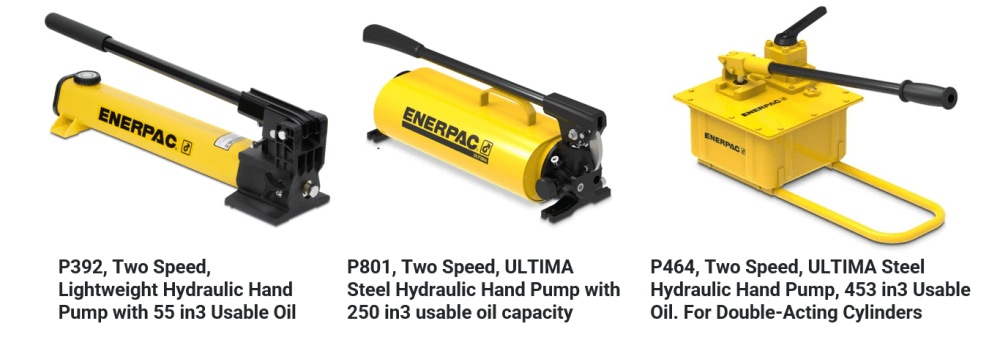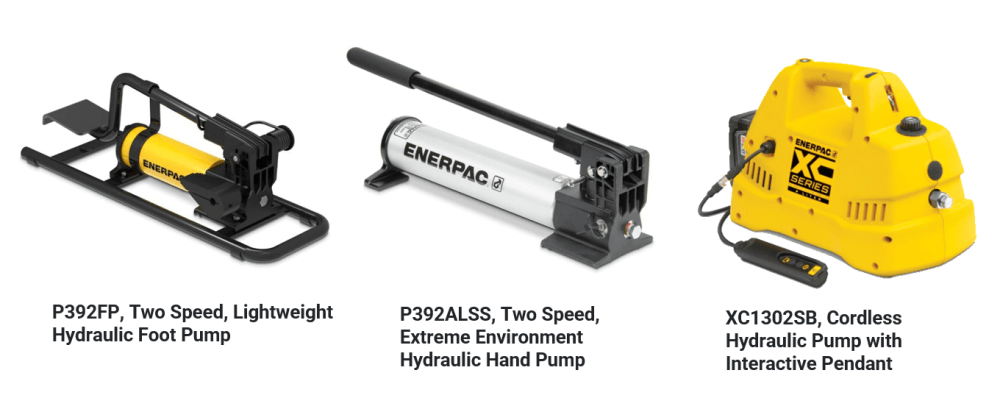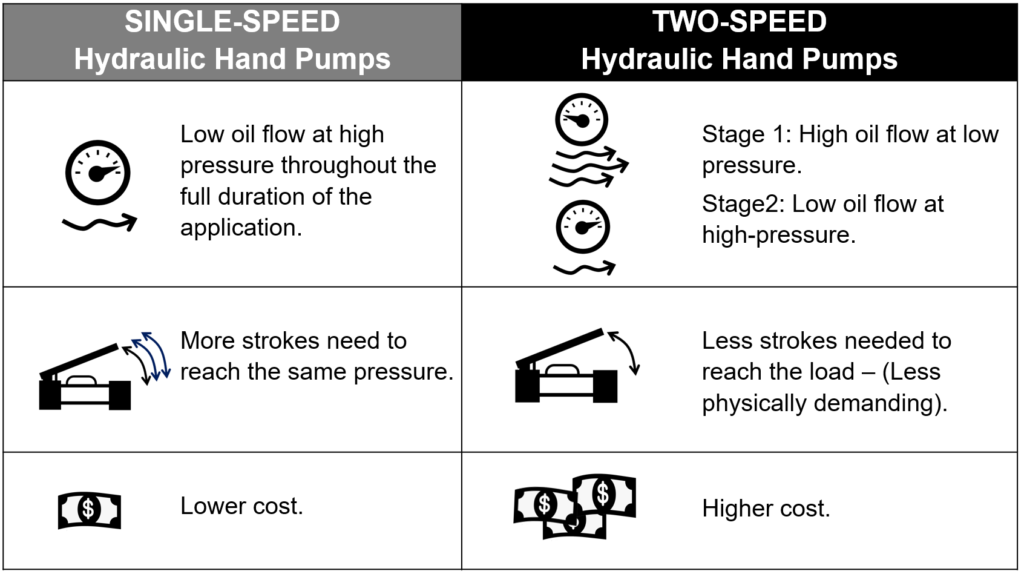What are the Different Types of Enerpac Hydraulic Pumps?
Want to Know About Enerpac Products?
Want to Know About Enerpac Products?
A hydraulic hand pump is a simple, yet essential piece of equipment used in a variety of industries. They are vital for many force applications – especially in construction, manufacturing, and maintenance operations.
However, with so many different models on the market, it can be difficult to know which is best suited to your type of work. This guide will help you understand the different pump types and their features.
Before you go ahead and buy a hydraulic hand pump, it’s important to do your research and understand their differences. With so many to choose from, you will want to compare features and prices. It is also a good idea to assess the quality of the product and if it’s made by a reputable manufacturer.
A hydraulic hand pump does a simple job, which is to deliver pressurized hydraulic flow to a tool and then return it back to the pump reservoir. But that doesn’t mean you should take shortcuts and opt for the first one that appears in your internet search results. There are a few simple but important considerations to take on board that will steer you towards the right product.
When you are choosing a hydraulic hand pump, it is important to prioritise quality over price. A high-quality Enerpac pump will last longer and be more reliable than a cheaper model. You will save money in the long run as you won’t need to replace it for many years.
With each stroke of the handle on a single-speed hydraulic pump, hydraulic oil is drawn from the pump reservoir towards the tool by the same amount. For many applications, this simpler and lower-cost option is fine. But for projects needing greater flow, for example when oil is to be pumped to a large hydraulic cylinder (or multiple cylinders), a single-speed pump can be hard work.
The alternative is a 2 stage hydraulic pump (2 speed), which has the added advantage of delivering high flow at lower working pressures. This gets you faster to the point where the real work begins. It then automatically delivers low flow at high pressure just at the time when you need more control. Compared to a single-speed pump, some two-speed types can reduce the number of handle strokes by as much as 78%! For a more in-depth comparison read our other blog post.
Hydraulic hand pumps are available in a wide range of oil capacities. A small model typically has a usable capacity of around 20 in3 (327 cm3), but there are some with as much as 453 in3 (7423 cm3). A larger reservoir will give you more options but will obviously make the pump much heavier, so think about how much oil is really needed for the applications you intend to carry out.

Most people reading this article will be technical-minded engineers with a clear idea of the intended applications. With these projects in mind and an understanding of the key points we’ve covered above, hopefully, you will be in a good position to select the best hydraulic hand pump for your future projects. Here is a summary of the key considerations:
• Choose a quality product
• Single vs 2 stage pumps
• Oil capacity
• Low vs high pressure
• Materials: Metal vs Reinforced Nylon
• Single or double-acting cylinder compatibility
• Extreme environment pumps
• Consider alternatives
Most Enerpac Hydraulic Hand Pumps can withstand pressures up to 10,000 psi (700 bar), but this isn’t always necessary. For lower working pressures up to 5,000 psi (350 bar) the P18 is a cost-effective single-speed option. However, if you need a 2 stage hydraulic pump go for the P1425000.
When it comes to the materials used for the main body of the pump, you have the choice of steel or glass-filled nylon. There’s plenty of configurations available in both types, so it really comes down to your personal preferences, weight, and the working environment. Metal-bodied pumps are the traditional tried and tested option that offer reassurance to many people. However, glass-filled nylon reservoirs are also incredibly durable, and these offer an unrivalled combination of strength, weight, and resistance to corrosion. A glass-filled nylon pump will be a few pounds lighter than steel equivalents.
If you intend to use your pump with hydraulic cylinders, will these be single or double acting?
A double-acting cylinder gives you a faster and more controlled plunger retraction, but you will need a pump designed specifically for this purpose. Take a look at the P842, P84, and P464 models.
Safety should always be the number one concern, so choosing a good quality pump from a reputable manufacturer is an essential first step. Some features and tips relating to safety include;
• Non-conductive fiberglass handle
• Internal pressure relief valves for overload protection
• Lower handle effort of 2-stage pumps
• Handle lock and lightweight construction for easy carrying
• Corrosion-resistant finishes
• Using a pressure gauge as a ‘window’ to what’s going on within the system
• Always follow manufacturer operator instructions
• Consider extra safety tools such as the Hydraulic Coupler Bleed Tool for safe depressurization
• Make sure you keep threads on couplers clean and in good condition.
When working in extreme environments such as the oil & gas, or petrochemical industries, a hydraulic pump may be exposed to corrosive substances and extreme temperatures. For these situations consider pumps with corrosion-resistant materials such as stainless steel, nickel-plated valves and cylinders, anodization, and plastic-encapsulated metals. Viton® Seals will also offer heat and chemical resistance.

Foot Pumps
Would a foot pump suit you better? If crouching to activate your hand pump is an issue, or if you want to keep your hands free then a foot pump could be a good alternative option. Look at the P392FP which is a 2 stage foot pump with a robust steel frame.
Hydraulic Foot Pumps
Powered Pumps
For ad-hoc projects, a hand pump is likely to be the right choice. But for frequent and repetitive projects – and especially those with multiple cylinders a powered pump could be much better for you. Plug in electric and compressed air hydraulic pumps are common. For remote locations without mains power or a compressed airline the choices are battery and gasoline-driven pumps.
Battery Driven Hydraulic Pumps
If your work involves using hydraulic cylinders buying a cylinder and pump set is a quick and easy way to get what you need, without the hassle of buying components separately. A set typically includes a single-acting hydraulic cylinder (aka a jack or ram), a two-speed pump, a 6-foot hose, calibrated gauge, and a gauge adaptor. Cylinder capacities vary from 5 to 100 tons and the pump options include hand or foot-operated models.
Cylinder and Pump set
What are the different types of Enerpac Hydraulic Pumps? Enerpac has a vast range of hydraulic pumps indeed Enerpac has a hydraulic pump and power unit to suit any type of application whatever you need. Some of the different types of Enerpac pumps include: Hand Pumps, Cordless Battery Pumps, Electric Pumps, Air Pumps, and Gasoline powered models, with multiple reservoir and valve configurations. Enerpac offers the most comprehensive high-pressure pump line available, and Hi-Press Hydraulics supplies the entire range. Enerpac Hydraulic Pumps provide the ideal solution to power both single & double acting hydraulic tools, providing a high power to weight ratio, plus Enerpac pumps are suitable for lifting a comprehensive range of heavy loads.
A hydraulic pump is a mechanical source of power that converts mechanical power into hydraulic energy. It generates flow with enough power to overcome pressure induced by the load.
At Hi-Press Hydraulics we stock an extensive range of Enerpac pumps and power units from manual pumps, cordless battery pumps, and Torque wrench pumps to work holding pumps and tensioner pumps, whatever your application needs we have the Enerpac product that will be the perfect solution. With 1000’s of combinations of Enerpac Hydraulic pumps available, choosing the right tool for the job could be difficult, but our team at Hi-Press Hydraulics Ltd is here to help.
Please find detailed below the different types of Enerpac Hydraulic pumps available. By clicking on the link you will be able to find out more about our vast range of Enerpac pump products and accessories
If you need a hydraulic hand pump one of the most fundamental things to understand is whether you need a single-speed or 2 speed hydraulic hand pump.
So, what’s the difference and how do you decide?
A single-speed hydraulic hand pump is a simple and relatively low-cost option. As you pump the lever, the hydraulic oil is drawn from the pump’s reservoir towards your hydraulic tool – (which may be a hydraulic cylinder, ram, puller, or a press).
When using a single-speed hydraulic pump with a tool such as a cylinder, the plunger will advance by the same amount with each stroke of the pump’s handle. The reason for this is because the amount of oil displaced per full stroke is always the same.
For many applications, this is exactly what’s required. But for projects where a cylinder or other tool needs to extend large distances this can be too time-consuming and tedious. This is when a two-speed pump can save the day.
A 2 speed hydraulic hand pump switches from an initial low-pressure, high oil displacement stage to a low-displacement, high-pressure stage.
When used with a hydraulic cylinder, this means the greater oil flow in the first stage moves the cylinder plunger a longer distance with each stroke. When it reaches the changeover pressure, the two-speed pump switches from low to high-pressure pistons – typically when the cylinder reaches the load and starts working harder
A two speed hydraulic hand pump can be more advantageous than a single-speed one for applications such as pressure testing, hydraulic presses, and long-stroke cylinders. However, they aren’t suitable for jobs requiring high pressure ‘all the way’.

Enerpac P392 Hand Pump Two Speed
A single-speed hydraulic pump provides low flow with high pressure – which is usually fine for smaller stroke hydraulic cylinders, flange spreaders, and pullers.
A two-speed hydraulic hand pump creates high flow at lower working pressures and can also provide lower flow when it reaches the higher working pressures. This is especially useful when the cylinder plunger or other hydraulic tool has far to travel before the real work begins. Compared to a single-speed pump, some two-speed types can reduce the number of handle strokes by as much as 78%.
Both types of pumps are available with different oil capacities, and in configurations to suit tools requiring both single and double-acting hydraulic flow.

 Enerpac New Product Wheeled Toolbox
Enerpac New Product Wheeled Toolbox